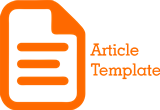Implementation of Knowledge Sharing and Pedagogy Genre in Essay Writing Learning
Abstract
Keywords
Full Text:
PDFReferences
Abualoush, S., Obeidat, A. M., Aljawarneh, N. M., Al-Qudah, S., & Bataineh, K. (2022). The effect of knowledge sharing on the relationship between empowerment, service innovative behavior and entrepreneurship. International Journal of Data and Network Science, 6(2), 419-428. https://doi.org/10.5267/j.ijdns.2021.12.012
Dirgeyasa, I Wy. 2018. CollegeAcademic Writing: A Genre-Based Persfective. Jakarta: PrenadaMedia Group.
Emilia, Emi. 2012. Pendekatan Genre Based dalam Pengajaran Bahasa Inggris: Petunjuk untuk Guru. Bandung: Rizki Press. Hamalik, Oemar. 2008. Perencanaan Bahan ajar Berdasarkan Pendekatan Sistem. Bandung: Penerbit Bumi Aksara.
Hermansson, C., Jonsson, B., Levlin, M., Lindhé, A., Lundgren, B., & Norlund Shaswar, A. (2019). The (non)effect of Joint Construction in a genre-based approach to teaching writing. Journal of Educational Research, 112(4), 483-494. https://doi.org/10.1080/00220671.2018.1563038
Kartika-Ningsih, H., & Rose, D. (2021). Intermodality and Multilingual Re-Instantiation: Joint Construction in Bilingual Genre Pedagogy. Ikala, 26(1), 185-205. https://doi.org/10.17533/udea.ikala.v26n01a07
Muhamad, M., & Seng, G. H. (2022). Issues in the Implementation of 21st Century Learning Skills in Malaysian ESL Classrooms. Asian Journal of University Education, 18(4), 1093-1104. https://doi.org/10.24191/ajue.v18i4.20040
Purba, R. (2020). Using Genre-based Approach to Overcome Students ' Difficulties in Writing. 7(4), 464-470. https://doi.org/10.20448/journal.509.2020.74.464.470
Rashtchi, M. (2019). Scaffolding argumentative essay writing via reader-response approach: a case study. Asian-Pacific Journal of Second and Foreign Language Education, 4(1), 12. https://doi.org/10.1186/s40862-019-0078-2
Setyowati, L., & Sukmawan, S. (2021). News as authentic materials to improve essay writing in a hybrid learning setting. Studies in English Language and Education, 8(3), 1194-1208. https://doi.org/10.24815/siele.v8i3.19851
Suwandi, S. (2020). Pengembangan Kurikulum Program Studi Pendidikan Bahasa (dan Sastra) Indonesia yang Responsif terhadap Kebijakan Merdeka Belajar-Kampus Merdeka dan Kebutuhan Pembelajaran Abad ke-21. Seminar Nasional Pendidikan Bahasa Dan Sastra, 1(1), 1-12. https://ejournal.unib.ac.id/index.php/semiba/article/view/13356
Tung, Khoe Yao. 2018. Memahami Knowledge Management. Jakarta: Indeks.
Yilmaz, A. (2021). The Effect of Technology Integration in Education on Prospective Teachers' Critical and Creative Thinking, Multidimensional 21st Century Skills and Academic Achievements. Participatory Educational Research, 8(2), 163-199. https://doi.org/10.17275/per.21.35.8.2
Zhang, T., & Zhang, L. J. (2021). Taking Stock of a Genre-Based Pedagogy: Sustaining the Development of EFL Students' Knowledge of the Elements in Argumentation and Writing Improvement. Sustainability, 13(21), 11616. https://doi.org/10.3390/su132111616
DOI: http://dx.doi.org/10.37905/aksara.9.2.1151-1160.2023
Refbacks
- There are currently no refbacks.
Copyright (c) 2023 Aksara: Jurnal Ilmu Pendidikan Nonformal

This work is licensed under a Creative Commons Attribution-ShareAlike 4.0 International License.
Publisher:
Magister Pendidikan Nonformal Pascasarjana Universitas Negeri Gorontalo
Jl. Soedirman No. 06 Gorontalo 96128 e-mail: jurnalaksara@ung.ac.id
http://ejurnal.pps.ung.ac.id







